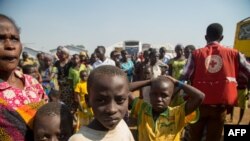The U.N. refugee agency reports it has had to severely cut vital aid programs for millions of refugees this year because it has only received slightly more than half of the $8.2 billion needed for humanitarian operations.
A record 68.5 million people are forcibly displaced worldwide, 25.4 million of them refugees. As the number of people displaced by conflict and persecution goes up, the U.N. refugee agency notes the money needed to care for them is going down.
UNHCR spokesman Babar Baloch says this is increasing the suffering of refugees and internally displaced people. With limited cash, he says priority has to be given to life-saving interventions, food, shelter and health care.
He tells VOA that even these sectors are being cut. As a consequence, he says in many refugee situations, malnutrition levels are rising, health facilities are overstretched, and shelters are becoming increasingly dilapidated. He cites Burundi as an example.
“Children who have fled Burundi as refugees and are in the neighboring countries, they are forced either in overcrowded schools or taking classes under tree shades," Baloch said. "And, also protection interventions and support to unaccompanied children and victims of sexual abuse and violence, that also affects.”
The UNHCR reports Burundi, the Democratic Republic of Congo, Afghanistan, South Sudan, Syria and Somalia are the six refugee and displacement situations most badly hit by the funding crisis.
For example, in Burundi it notes refugees do not have enough food to feed their families because of ration cuts. It finds in conflict-ridden DRC and in countries hosting Congolese refugees, young people in particular are unable to find work and get an education.
The UNHCR says nearly 12 million Syrian refugees and internally displaced people are in a bad situation because the money available is just enough to provide them with the bare minimum needed to survive.





